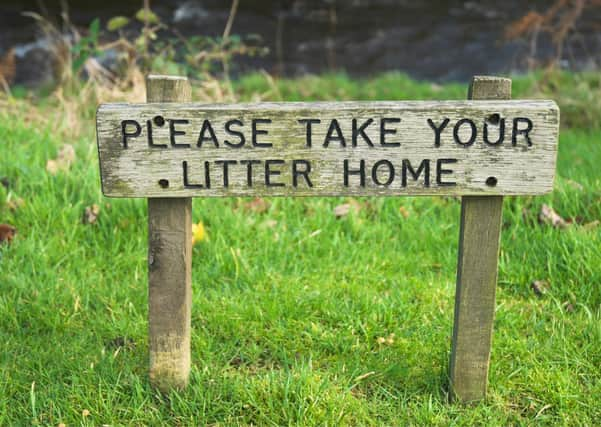Should we have the ‘right to roam’ in our countryside?


Admittedly, all of this has to be kept in context. England has a population of some 50 million people. The equivalent figure for Northern is approximately 1.8 million.
But population aside, the two countries operate to two different codes when it comes to the emotional issue of the public accessing the countryside. Across the water, legislation has been in place for a long time, which recognises the public’s right to access the countryside on an agreed basis.
Advertisement
Advertisement
A comprehensive network of paths and footways are in place to facilitate this happening without landowners having to worry unduly about damage that could be caused to their property.


But, one would have to add that a fair degree of trust exists, from the perspective of all parties involved, to the extent that - come evening - the countryside will be left in the condition it was found in at the beginning of the day.
Now I know that the history of land ownership is entirely different in Northern Ireland than is the case in the rest of the UK. Locally, 90% plus of the land is farmer owned and worked accordingly. Contrast this with the situation in England, Scotland and Wales where a large proportion of the farms are managed on a tenanted basis.
But one thing that cannot be denied is the desire on the part of people in Northern Ireland to spend more time in the countryside. The huge crowds that thronged the Black Mountain, Divis and the myriad forest parks across all six counties last year is testimony to this fact.
Advertisement
Advertisement
And no doubt the coming weeks will see large crowds visiting many of our renowned beauty spots once again.
The Easter weekend is that turning point in the year when so many of us start thinking about the great outdoors.
I hear people referring to the resurgence in home cooking as a direct consequence/benefit of the Covid lockdown. But there’s little doubt, in my mind, that we can also add the enhanced ‘desire’ amongst the public at large to get out into the countryside as another consequence of the pandemic control measures put in place over the past 12 months.
But the growing demand to get out into the countryside has come at a cost. I read recently about the significant damage that has been caused to the heath land soils of the Divis and Black Mountains over the past year – a direct result of the significant increase in human usage of the pathways and surrounding areas that has taken place during this time period.
Advertisement
Advertisement
So given this backdrop, do we need to expand the scope that exists to allow people to enjoy our open spaces in a rural areas in a sustainable manner?
Or put another way, is there a case to be made for giving the public greater access to the vast acreages of farmer-owned land that surrounds all our towns and cities?
By common consent, we have a beautiful countryside: so how do we arrive at a position that allows the public to see more of it while still giving primacy to farmers, who have the job of maintaining it?
Mention of the word farmer brings me quickly around to what I believe to be the focal point of this discussion. The countryside that we all admire today has been created by generations of farmers, going back over centuries.
Advertisement
Advertisement
It is in farmers’ DNA to want to protect this resource; a point that is often overlooked by those who want to criticise modern agricultural practises. The fact is that the patchwork of fields with their intricate pattern of hedgerows has been maintained intact over so many years.
The end result is a resource that encourages diversity within our truly unique, rural environment.
So much for the background.
Northern Ireland’s farm minister Edwin Poots MLA is very aware of the growing public demand to access more of our countryside. He said: “My Department is currently carrying out a review of access to the countryside by way of a two stage process. Stage one is targeted at key stakeholders which either use the legislation or are directly affected by it, such as farming organisations, councils, environmental NGOs, recreational users, relevant government and public bodies. The consultation exercise will finish at the end of March with the responses assisting to inform a more general public consultation (stage two) exercise later in the year.
“The aim of this consultation is to seek the views of key stakeholders on the current provision members of the public have to Northern Ireland’s natural environment for outdoor recreation, and investigate how provision can be improved, while protecting the environment and recognising the needs of landowners.”
Advertisement
Advertisement
The Minister continued: “I understand the desire for additional opportunities for walking and other recreational opportunities throughout Northern Ireland as is evident during the Covid 19 crises. This has resulted in many existing off road paths being used more extensively.
“The initial consultation on access/recreation with key stakeholders is intended to tease out issues relating to existing access provisions. The objectives of the exercise are therefore to ensure better clarity in implementing the legislation and to see if there are opportunities to add additional routes for walking, etc., through wider usage of public lands where appropriate or on private lands with revised agreement arrangements. I fully understand some landowners would have concerns with instances of littering, vehicles being parked in gateways etc.
“But, hopefully, with appropriate signage provided by councils for such routes, any disruption for landowners would be minimal.
“Northern Ireland’s outdoor areas and scenic spots have seen a huge increase in visitor numbers since the COVID-19 pandemic began.
Advertisement
Advertisement
“This is extremely positive for everyone’s health and wellbeing and connection to the environment, however it has brought with it challenges such as littering, irresponsible car parking, livestock worrying, disturbance to wildlife, dog waste and damage which can be caused by wild camping and wildfires.”
He concluded: “This week, Outdoor Recreation NI launched a ‘Right Side of Out Side’ campaign with grant aid from the DAERA Environment Fund, which aims to generate awareness of these concerns and encourage more positive behaviours.
“I applaud the efforts of organisations such as Outdoor Recreation NI, Mountaineering Ireland and National Trust which are promoting responsible behaviour for outdoor recreation participants and are currently increasing this messaging for spring.”
The Chair of Outdoor Recreation NI is Dawson Stelfox MBE, the first Irish man to climb Mount Everest. He pointed out that people in Northern Ireland have currently much less access to the countryside than those in England, Scotland and Wales, adding: “Even with most publicly owned land there is no right of access. This not only limits opportunities for many people to get the proven mental and physical health benefits of being active in nature but increases pressure on key sites, causing congestion, erosion and disruption to local communities.
Advertisement
Advertisement
“I believe there should be a right of responsible access to all publicly owned land, with active promotion and development of trailheads and access points. Currently there is only right of public access to Forest Service Lands but other statutory bodies such as NI Water, own large and highly significant areas such as the central Mournes.”
Turning to privately owned lands Stelfox said there are a number of exciting access developments with farmers, estates and other landowners with trail development through permissive path agreements through which the local Council take on all liability from the landowner and allow visitor pressure to be proactively managed.
He continued: “This is the way forward for low level and enclosed landscapes and there are many benefits for users and landowners alike. I would like to see open, unenclosed upland areas designated as ‘Outdoor Recreation Areas’ where the Council would indemnify the landowners from any public liability claims, but where a trail structure or linear permissive path agreement is inappropriate.”
Stelfox concluded: “Recreation is an established and valid land use and there are great opportunities for rural communities to gain from associated land management requirements and tourism. Achieving greater access to the countryside should be a shared goal between users, statutory bodies, land managers and owners and can bring great benefits to all.
Advertisement
Advertisement
“The Department of Agriculture, Environment and Rural Affairs is just finishing a consultation period on potential new countryside access legislation and I look forward to working with them to achieve sustainable access for all to the inspiring and precious resource that is the Northern Ireland countryside.”
Not surprisingly, the Ulster Farmers’ Union (UFU) takes the issue of public access to the countryside very seriously.
Union deputy president David Brown said: “Many local landowners and farmers have granted public access to farmland allowing walkers to enjoy the NI landscape. However, livestock worrying, litter, fly-tipping, disease risks, safety and liability are serious issues that farmers have concerns about when access to farmland is proposed.
“Unfortunately, last year with the first lockdown, farmers saw a notable increase in the number of livestock worrying and littering incidents as well as vehicles being parked in gateways and entry points blocking essential access to farmland.
Advertisement
Advertisement
“The UFU have met with several recreational organisations to raise awareness of these issues and are working to inform the public of best practice when out and about in the countryside.”
He added: “We believe that access to the considerable area of publicly owned land in rural areas should be fully exploited before pursuing access onto private land. Much of this public land is currently underused. “The UFU is supportive of agreed and organised access to private farmland if local landowners are in full agreement and landowners are indemnified against litigation.”
The National Trust is committed to caring for and providing access to coast, countryside and historic sites for everyone to enjoy.
The organisation’s Assistant Director Jonny Clarke confirmed that the Covid pandemic and the impact of lockdowns has shown just how important it is for people to have access to nature and the outdoors, adding: “People enjoy nature. Being outside is also good for their mental and physical health and wellbeing.
Advertisement
Advertisement
“Our ongoing investment in trails, footpaths, stiles and way-marking not only helps visitors enjoy safe and comfortable access, it also protects nature, enabling plants and wildlife to flourish.”
Clarke continued: “We have seen a significant increase in visitors to our outdoor places across Northern Ireland, and it is wonderful to see so many people enjoying the benefits of nature.
“As everyone looks forward to the Easter break, we would encourage visitors to stay local, and to look after our places by taking their litter home with them and sticking to the paths.
“It’s very important if car parks are full to be respectful of our neighbours and to avoid parking on the roadside or at gates.”
There seems little doubt that pressure is mounting to allow people greater to the countryside.
Let’s just hope that we end up with a win:win scenario for everyone involved!